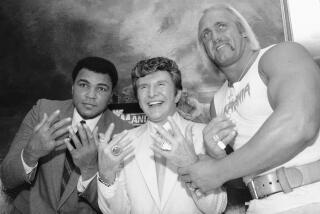From the archives:: Muhammad Ali wants boxing commission
Muhammad Ali might not be as loquacious as in his youth, but his words before a congressional subcommittee Thursday needed no translation: Boxing reform is not yet finished.
âThere are still disturbing indications that federal, state and tribal enforcement of boxing laws has been spotty and in some respects, nonexistent,â Ali, who suffers from Parkinsonâs disease, said in a statement read by his wife, Lonnie.
Aliâs testimony at a congressional hearing came as lawmakers debated whether to increase regulation of the sport. Legislation sponsored by Sen. John McCain (R-Ariz.) and already passed in the Senate would create a uniform medical registry and require licensing for all organizations that rank boxers. Rep. Peter T. King (R-N.Y.) has introduced a similar bill in the House.
Such legislation would not be the first to regulate boxing â or the first to receive support from Ali and other boxing stars. In 1996, the Professional Boxing Safety Act mandated state supervision and basic safety standards at all matches. Four years later, the Muhammad Ali Boxing Reform Act expanded the law to prohibit conflicts of interest between boxing managers and promoters and require certain financial disclosures.
But the legislation failed to ensure the safety and health of the man in the ring, Ali and other boxing officials told the House Energy and Commerce subcommittee on commerce, trade and consumer protection.
Ali pointed to a 2003 General Accounting Office report acknowledging that state and tribal commissions did not adequately uphold basic federal protections.
A key need, Ali said, is the creation of a U.S. Boxing Commission with the authority to regulate a sport that âstill attracts a disproportionate number of unsavory elements that prey upon the hopes and dreams of young athletes.â
The creation of a federal commission would be the first for any sport, officials said.
Such a step is critical to keeping boxing open to young people, Ali added, because, for many, it âremains the only way up and out from a life filled with bad choices, failure or worse.â
It is a path familiar to Ali, who grew up in the segregated South to become perhaps the most acclaimed boxing champion ever and, in his own words, one of the âprettiest men on the face of the Earth.â
The dayâs testimony painted a picture of a highly decentralized sport fraught with back-door deals and lax oversight. Boxing officials acknowledged that official rankings, which determine a fighterâs eligibility for championships, are often subjective and, in some cases, are the result of bribery involving fight promoters and the private organizations that compile the rankings.
Such tactics mean that few within the profession feel safe to speak out against these wrongs, said James J. Thomas, a longtime attorney for boxers, including former heavyweight champion Evander Holyfield.
âA small group of powerful people is responsible for the ills and wrongs of this sport,â Thomas said.
Robert Mack, chairman of the World Boxing Assn., questioned the extent of federal oversight proposed in the Senate bill. Although the government could do more to protect health and safety, Mack said, the industry has become far more transparent since the 2000 legislation.
Although committee members voiced support for reforms, Rep. Cliff Stearns (R-Fla.), the subcommittee chairman, said there were still many obstacles ahead. Officials of states that already strictly regulate the sport, such as New York and Nevada, donât want to increase federal oversight, Stearns said, and the cost of a national commission probably would face congressional opposition. Still, he said, the committee would pick up the topic during the next legislative session.
Note: This article was originally published on Sept. 10, 2004.
More to Read
Go beyond the scoreboard
Get the latest on L.A.'s teams in the daily Sports Report newsletter.
You may occasionally receive promotional content from the Los Angeles Times.










